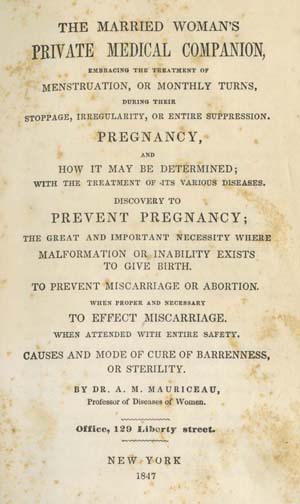New acquisition: “And Cheap at That”: Early American Marriage Manuals

The Married Woman’s Private Medical Companion (New York, 1847)
This past month, we bought a copy of the first edition of The Married Woman’s Private Medical Companion (New York, 1847), by an “A.M. Mauriceau,” in part because it contains a remarkable inscription:
“Book Bought April 22d 1848 of a Picture Pedlar at 4/ — + cheap at that.”
The book subsequently went through some twelve editions and provides useful information on human sexuality and reproduction, much of which we would recognize as fundamentally accurate today (although the text suggests that the “semen of the female” unites with the “semen of the male” for conception to occur).
What makes this a tawdry book to be bought for four shillings (or half a dollar) from a “picture pedlar” (a phrase with the hint of pornography) is its extra roles as a mail order catalog for condoms and as an advertisement for abortion services. By mailing “Dr. Mauriceau” five dollars, one might buy a dozen condoms, and have them sent to “any part of the United States” (p. 144). Only slightly more delicately does he offer his services “to effect miscarriage” at his office at 129 Liberty Street in New York City. (See the wording on the title page, above.)
Who was “Dr. Mauriceau”? According to Janet F. Brodie, writing in her 1994 book Contraception and Abortion in Nineteenth-Century America, “Dr. A.M. Mauriceau” was the pseudonym of either the husband or the brother of Ann Lohman (elsewhere Caroline Lohman), a notorious abortionist who went by the name “Madame Restell.” In 1847, Mrs. Lohman was in prison, having been convicted of second-degree manslaughter after performing an abortion in July 1846 on an unmarried servant who was six months pregnant with her employer’s child. To give you an idea of the popular opinion of Mrs. Lohman, we reproduce an illustration from the trial pamphlet, which shows her above a winged demon holding a fetus in its jaws.
Marriage manuals “for women” (wink, wink) were not uncommon in 19th-century America. One of the most widely available was Frederick Hollick’s The Marriage Guide, of which we have a copy from the undated “196th edition.” Hollick, an early follower of birth-control advocate Robert Dale Owen, warns the reader against the use of the following abortifacients: alum, sulphate of zinc, chloride of zinc, and sulphate of iron, by saying that they cannot be used safely by women at the levels necessary to kill the “seminal animalcules” (p. 323). By this rhetorical strategy, Hollick makes his book overtly anti-abortion in tone, while providing the information which might be used to induce a “miscarriage.”
Consider, also, that Hollick’s book (available wholesale from his publisher T.W. Strong, or singly for one dollar) has its title in gold on the spine, while Mauriceau’s book (at half the price) has an unadorned spine on all of the five copies from various editions in our holdings. Hollick’s attractive spines suggest his books could be openly displayed in stores or on newsstands, while the lack of lettering or decoration on Mauriceau’s fits the idea that peddlers might sell them slyly, or merchants might keep them under the counter.
The consequences of the two approaches to the content and packaging of marriage manuals were quite different as well. In 1846, the year Mrs. Lohman was tried and convicted of manslaughter, Frederick Hollick was tried and acquitted for obscenity. The subterfuge of the pseudonym protected the actual author of The Married Woman’s Private Medical Companion from the charge of obscenity, thus allowing Mrs. Lohman’s husband and brother to advertise condoms and their abortion services with a certain impunity … while she herself was serving time in prison for manslaughter.

Leave a Reply
Want to join the discussion?Feel free to contribute!